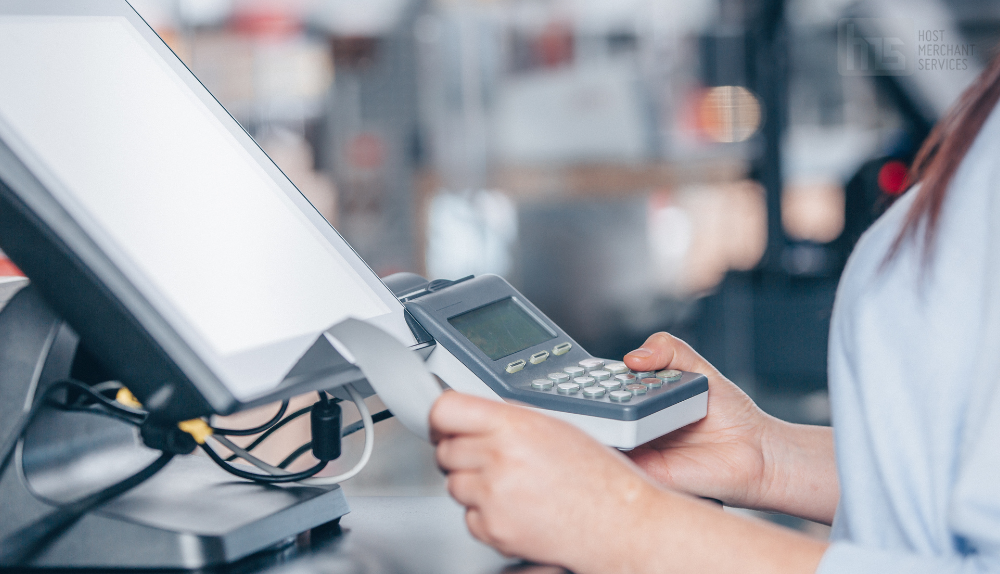
Cloud-Based vs. Server-Based POS Systems
- 29th Jun, 2023
- | By max
- | Uncategorized
Point of Sale (POS) systems, sometimes referred to as Point of Purchase systems, encompasses both the physical devices and the software applications that businesses deploy to handle and oversee sales transactions. They find extensive applications in various commercial settings, including but not limited to retail shops, dining establishments, hospitality services, and numerous other businesses that offer goods or services directly to their customers. Today we will compare Cloud-Based vs. Server-Based POS Systems, their pros and cons, and which industries can use them.
A POS system typically includes several components, including a computer or mobile device, a cash register or terminal, barcode scanners, receipt printers, and software applications. These components work together to enable businesses to process sales transactions, track inventory, generate sales reports, and manage customer data.
Cloud-Based POS Systems
Definition and Characteristics: Cloud-based POS systems are POS systems where the software and data are stored and accessed through remote servers over the internet. Instead of relying on local servers or infrastructure, these systems utilize cloud computing technology to provide the necessary functionality. Critical characteristics of cloud-based POS systems include:
Unified Data Repository: Information pertaining to sales operations, stock levels, and client data are securely housed in the cloud and available from any device with the proper authorization and internet connectivity.
Web-Based Access: Cloud-based POS systems are typically accessed through web browsers or dedicated applications, allowing users to manage sales and monitor operations from various locations and devices.
Compatibility Features: These platforms frequently provide harmonization with various other corporate tools, like financial management software, online commercial interfaces, and client relationship management (CRM) solutions. This facilitates uninterrupted data transmission and efficient workflow management.
Advantages Cloud-Based POS Systems
Accessibility and Mobility: Cloud-based POS systems provide the convenience of accessing sales and business data from anywhere with an internet connection. This flexibility allows business owners and employees to monitor sales, manage inventory, and analyze reports remotely, even when away from the physical store or location.
Scalability and Flexibility: Cloud-based POS systems can quickly adapt to changing business needs. They offer scalability, allowing businesses to add or remove functionalities, users, or locations as required. This flexibility is particularly beneficial for businesses experiencing growth or seasonal fluctuations.
Affordability: POS systems operating on cloud technology usually adopt a pay-as-you-go pricing structure, where companies incur a regular charge depending on utilization or the number of users. This negates the necessity for hefty initial expenditures on hardware and setup, thus presenting a more budget-friendly solution, particularly for small to mid-sized businesses.
Limitations Cloud-Based POS Systems
Dependence on Internet Connectivity: Since cloud-based POS systems rely on Internet connectivity, any disruption or slow Internet speed can impact system performance and hinder transaction processing. This dependency on internet connectivity may pose challenges in areas with unreliable or limited internet access.
Data Security Concerns: Storing sensitive business and customer data in the cloud raises security considerations. While cloud providers typically implement robust security measures, there may still be concerns about potential data breaches or unauthorized access. Adequate data protection measures, such as encryption and access controls, should be implemented to mitigate these risks.
Server-Based POS Systems
Definition and Characteristics: Server-based POS systems are POS systems where the software and data are stored and processed locally on dedicated servers within the business premises. These systems rely on local infrastructure and do not rely heavily on internet connectivity for their core functionalities. Critical characteristics of server-based POS systems include:
Local Infrastructure: Server-based POS systems utilize dedicated servers on-site or within the business premises to store and process data. This provides businesses with direct control over their system and data.
On-Premises Software: The software application used in server-based POS systems is installed and runs directly on the local servers. This setup allows businesses to have complete control over software customization and configuration.
Reduced Dependency on the Internet: Server-based POS systems have a lower reliance on Internet connectivity than cloud-based systems. While some features may require internet access, the core functions can operate independently without a continuous internet connection.
Advantages Server-Based POS Systems
Local Control and Independence: With server-based POS systems, businesses have complete control over their infrastructure, data, and system configurations. This level of control can be advantageous for businesses with specific needs or strict compliance requirements.
Faster Processing Speeds: Since data is processed locally, server-based POS systems often provide faster transaction processing speeds than cloud-based systems. This can result in quicker checkout times and enhanced customer satisfaction.
Lower Reliance on Internet Connectivity: Server-based POS systems depend less on Internet connectivity for day-to-day operations. Even during internet outages, businesses can continue processing transactions and maintaining basic functionality.
Limitations Server-Based POS Systems
Higher Upfront Costs: Server-based POS systems typically require significant upfront investments in hardware, servers, and networking infrastructure. This can be a barrier for small businesses or startups with limited budgets.
Limited Scalability: Server-based systems may have limitations regarding scalability. Adding new functionalities, expanding to multiple locations, or accommodating business growth may require additional hardware investments and IT expertise.
Maintenance and Support Requirements: Server-based POS systems require regular maintenance, updates, and backups to ensure smooth operation. Businesses must have in-house IT resources or external contract support for system maintenance and troubleshooting.
Comparison of Cloud-Based Vs Server-Based POS Systems
Cost Considerations
Initial Investment:
Cloud-Based: Cloud-based POS systems typically require lower upfront investments since businesses don’t need to purchase and maintain dedicated servers or infrastructure. Instead, they usually pay a subscription fee based on usage or the number of users.
Server-oriented: The initial expenses related to server-oriented Point of Sale (POS) systems can be considerable, with costs associated with acquiring servers, networking gear, and software permits. This can pose a challenge for businesses operating within restricted financial boundaries.
Ongoing Expenses:
Cloud-Based: Cloud-based systems have ongoing subscription fees, which can vary based on usage and feature packages. However, they often include updates, maintenance, and support in the subscription cost.
Server-Based: Server-based systems may have lower ongoing subscription costs since businesses own the infrastructure. However, they have additional expenses for maintenance, updates, backups, and potential IT support.
Accessibility and Mobility
Cloud-Based: Cloud-based POS systems offer greater accessibility and mobility since they can be accessed from any authorized device with internet connectivity. Users can monitor sales, manage inventory, and analyze data remotely, providing flexibility and convenience.
Server-Based: Server-based systems typically have limited accessibility and mobility since they rely on local infrastructure. Users can only access the system on-site, limiting their ability to manage operations remotely.
Scalability and Flexibility
Cloud-oriented systems stand out due to their unparalleled scalability and adaptability. They’re capable of effortlessly meeting the needs of expanding enterprises by adding or subtracting features, users, or sites as needed. Companies can adjust their operations upward or downward without requiring substantial hardware investments.
Server-Based: Server-based systems may have limitations in scalability. Expanding to multiple locations or adding new functionalities can require additional hardware investments and IT expertise. Scaling up may involve costs and complex migrations.
Security and Data Protection
Cloud-Based: Cloud-based systems often employ robust security measures, including data encryption, access controls, and regular backups. However, businesses must choose reputable providers and implement proper security protocols to mitigate data breaches or unauthorized access risks.
Server-Based: Server-based systems give businesses more direct control over their data security. However, they require diligent implementation of security measures, including physical security, firewalls, and data backups, to safeguard against breaches or system failures.
Speed and Performance
Cloud-Based: Cloud-based systems’ performance depends on internet connectivity. While they can offer reliable performance in most cases, slow internet speeds or outages can impact transaction processing times.
Server-Based: Server-based systems often provide faster processing speeds since data is processed locally. This can result in quicker transaction processing and improved customer experiences.
Factors to Consider When Choosing Between Cloud-Based and Server-Based POS Systems
Nature of the Business:
Consider the specific requirements and nature of your business. Are you a small retail store, a large restaurant chain, or a service-based business? The type of business you operate can influence the choice between cloud-based and server-based POS systems.
Budget and Financial Resources:
Assess your budget and financial resources. Determine how much you are willing to invest upfront and what ongoing expenses you can afford. Consider the costs associated with hardware, software licenses, maintenance, support, and any potential upgrades.
Growth Plans and Scalability Needs:
Evaluate your business’s growth plans and scalability requirements. If you anticipate rapid growth or expansion to multiple locations, a cloud-based POS system may offer more flexibility and scalability. However, if your business is more stable and has predictable growth, a server-based system may suffice.
Security and Compliance Requirements:
Consider your specific security and compliance requirements. If your business deals with sensitive customer data or operates in an industry with strict regulations (e.g., healthcare or finance), evaluate the security features and data protection measures offered by both systems. Assess if the cloud-based solution meets the necessary compliance standards.
Internet Connectivity and Reliability:
Evaluate the quality and reliability of your internet connectivity. Cloud-based systems heavily rely on stable and fast internet connections for their operation. If you have consistent and reliable internet access, this may not be a significant concern. However, if you experience frequent internet outages or have limited connectivity options, a server-based system may be more suitable.
Case Studies: Real-World Examples
Success Stories of Businesses Using Cloud-Based POS Systems
Shopify:
Shopify is an e-commerce solution offering a point-of-sale system based in the cloud. This platform ensures smooth integration between digital and physical sales channels.
Success: Shopify’s cloud-based POS system has empowered small businesses and entrepreneurs to set up and manage their retail operations quickly. It enables them to sell products both in-store and online, providing a unified platform for inventory management, sales tracking, and customer engagement.
Square:
Square offers a cloud-based POS system that caters to various businesses, including retailers, restaurants, and service providers. Their system combines hardware, software, and payment processing services.
Success: Square’s cloud-based POS system has simplified payment processing for small businesses. It provides them an affordable and user-friendly solution for accepting credit card payments, managing inventory, and generating sales reports. Square’s system has empowered many businesses to enhance their operations and expand their customer base.
Examples of Businesses Benefiting from Server-Based POS Systems
McDonald’s:
McDonald’s is a global fast-food chain with a server-based POS system. Their system integrates order-taking, kitchen display systems, and inventory management.
- Benefit: McDonald’s server-based POS system allows for efficient order processing, synchronization with kitchen operations, and real-time inventory management. The system is designed to handle high transaction volumes and ensure seamless operations across their extensive network of restaurants.
Luxury Hotels and Resorts:
Many luxury hotels and resorts rely on server-based POS systems to manage their complex operations, including room charges, restaurant billing, spa services, and more.
Benefit: Server-based POS systems in luxury hotels and resorts offer comprehensive functionality tailored to their needs. These systems seamlessly integrate various departments and offer advanced features like guest profiles, loyalty programs, and customized billing options.
Final thoughts
A cloud-based and server-based POS system depends on the specific needs of a business. Cloud-based systems offer flexibility, accessibility, and cost-effectiveness, making them suitable for small to medium-sized businesses. They provide scalability, remote management capabilities, and automatic updates. However, they rely on internet connectivity and raise data security concerns.
On the other hand, server-based systems offer local control, faster processing speeds, and enhanced data security. They are favored by larger businesses with complex needs but require higher upfront costs and maintenance.
Considering factors such as the nature of the business, budget, scalability needs, security requirements, and internet connectivity reliability is crucial in making an informed decision. Both systems have proven successful in various industries, empowering businesses to streamline operations and enhance customer experiences.



